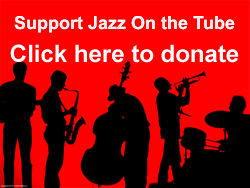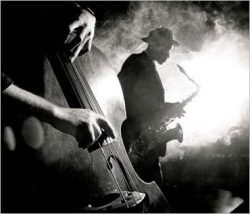
Chano Pozo (left) and Dizzy Gillespie (right) patron saints of Afro-Cuban jazz
I recently heard that the Manhattan School of Music plans to discontinue its semester-long world class Afro-Cuban Orchestra program under the able direction of master musician and educator Bobby Sanabria and replace it with a two week program taught by visiting instructors.
This news hurts my soul on so many levels.
Here are just three that stand out:
#1. The Manhattan School of Music’s existing Afro-Cuban music program is arguably the best of its kind in the world.
What else would one expect when you combine some of the world’s most talented and dedicated music students with one of the great living masters of the tradition in the lineage of Mario Bauza and Tito Puente in the birthplace of Afro-Cuban jazz, New York City.
#2. The Latin influence is essential for learning, playing, understanding and appreciating jazz. The Latin contribution to jazz is not a sideshow. It’s as close to the music’s essence as blood in the veins. For jazz to thrive, this connection needs to be maintained, appreciated and honored.
#3. We live in an era when our Latin population is under attack. The disgraceful abandonment of the US citizens of Puerto Rico after their 2017 hurricanes is just one example. The legal kidnapping of the children of Latin migrants at the border, without adequate plans to care for them or reunite them with their parents, is another.
By maintaining this one-of-a-kind cultural resource – its Afro-Cuban music program – The Manhattan School of Music provides a strong, moral counterbalance to current socially negative trends.
I recently sent this letter to the School’s president.
I encourage you to send your own well-though-out and polite comments to President Gandre, or you can copy my letter and send it to him with an endorsement of its sentiments.
– Ken
James Gandre, President
Manhattan School of Music
120 Claremont Avenue
New York, NY 10027
Dear President Gandre,
To start, let me just say that I can’t imagine the challenges you must face keeping a conservatory open and thriving in one of the world’s most expensive cities in this most economically challenged time.
The ongoing task of balancing important legacies with practical necessities must be wrenching at times.
One of the School’s most impressive legacies is the number of graduates whose work has been and continues to be essential to the development and preservation of jazz.
The School’s alumni list in this field is populated with giants of the music and is nothing short of staggering: Donald Byrd, Ron Carter, Herbie Hancock, Yusef Lateef, Herbie Mann, Hugh Masekela, John Lewis, Max Roach, Don Sebesky, Phil Woods, and many others.
One of the essential elements of jazz – starting in its formative days in New Orleans and continuing straight through to the present day – is the influence of Latin American rhythms, genres, sensibilities, and artists on the music.
Jelly Roll Morton, a jazz pioneer of Creole heritage, made this point most clearly when he stressed that to play jazz correctly one must include a “Spanish tinge.” He was referring to the “tresillo” and “habanera” rhythms of Cuba, then an active commercial and cultural trading partner with New Orleans.
Later, in the 1940s and 1950s when jazz underwent a major creative explosion centered in New York City, Latin composers, arrangers, band leaders and musicians again played an essential, if not properly heralded, role.
Because of this, I’ve always thought that the dedication the Manhattan School of Music has shown to giving Afro-Cuban jazz a full and secure home made it one of the most authentic and sophisticated conservatories in the nation.
For this reason, I request as a fan, a producer, a lifelong student of jazz, and a lover of mankind’s musical impulse, that you continue the semester long Afro-Cuban Jazz Orchestra with Bobby Sanabria, who has led it so masterfully, at the helm. His ongoing dedication and accomplishments speak for themselves and make him the ideal person for this most important cultural work.
Thank you for you consideration.
Sincerely,
– Ken McCarthy
Jazz on the Tube
P.S. Our unique programming is made possible by help from people like you. Learn how you can contribute to our efforts here: Support Jazz on the Tube
Thanks.







